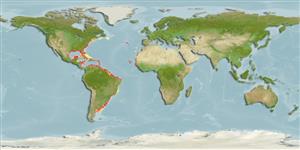Preferred temperature (Ref.
115969): 12 - 27.9, mean 24.4 (based on 656 cells).
Phylogenetic diversity index (Ref.
82804): PD
50 = 0.5039 [Uniqueness, from 0.5 = low to 2.0 = high].
Bayesian length-weight: a=0.01288 (0.01144 - 0.01451), b=2.95 (2.92 - 2.98), in cm Total Length, based on LWR estimates for this species (Ref.
93245).
Trophic level (Ref.
69278): 3.7 ±0.52 se; based on food items.
Daya lenting (Ref.
120179): sedang, Waktu penggandaan populasi minimum 1.4 - 4.4 tahun (tmax=4.5; assuming tm=2-3).
Prior r = 0.54, 95% CL = 0.36 - 0.81, Based on 2 data-limited stock assessments.
Fishing Vulnerability (Ref.
59153): Low to moderate vulnerability (29 of 100).
Climate Vulnerability (Ref.
125649): Moderate vulnerability (36 of 100).
